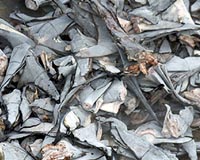 |
Galliano, Louisiana (AFP) May 31, 2010 Dozens of species of fish including one just discovered six months ago, could be wiped out by the massive oil leak in the Gulf of Mexico that has been spewing crude into the sea for six weeks, a scientist said Monday. "We may very well lose dozens of vulnerable fish species," Prosanta Chakrabarty, a fish scientist at Louisiana State University, told AFP by email. "Currently there are no reports about massive fish kills being sighted, but I'm afraid that a lot of damage is being done below the surface where the majority of oil is," he said. A species of bottom-dwelling fish called pancake batfish, which Chakrabarty discovered around six months ago in the area of the oil spill, some 50 miles (80 kilometers) off the coast of Louisiana, are particularly threatened by the oil that is hanging in large plumes underwater. Pancake batfish eat small invertebrates, which Chakrabarty said will be "hit hardest by the oil and dispersant mix" washing around in the Gulf. BP has been using a dispersant called Corexit to try to break up the millions of barrels of oil that are estimated to have gushed into the gulf since the Deepwater Horizon rig exploded six weeks ago on April 20 and sank into the sea two days later with the loss of 11 lives. "We know the oil and dispersant are toxic, and these batfish are low on the food chain, so I am worried that they will be susceptible," said Chakrabarty, who is due to publish a paper on the newly discovered fish in August. "Unfortunately, by August the oil spill will have leaked scores of millions of gallons of oil into their habitat, as well as a million gallons of toxic dispersant," he said, fearing the batfish might not live until they are introduced to the world in his report. BP engineers are scrambling to prepare their next bid to stop the oil from gushing into the sea, by using robotic submarines to cut off the burst pipe and then capping it before siphoning the oil up to vessels the surface. But officials from the British oil giant warned they may not be able to plug the Gulf of Mexico oil leak until August, when twin relief wells have been drilled.
Share This Article With Planet Earth
Related Links Farming Today - Suppliers and Technology
 Hawaii says no to shark fin soup
Hawaii says no to shark fin soupHonolulu (UPI) May 29, 2010 Shark conservation groups are praising Hawaii, which has become the first U.S. state to ban the sale, possession or distribution of shark fins. Violating the ban could prove expensive. The new ban orders state restaurants to stop selling shark-fin soup by July 2011, or face fines of up to $15,000 for a first offense, the Honolulu Star-Bulletin reported. The fines rise to $35,000 ... read more |
|
| The content herein, unless otherwise known to be public domain, are Copyright 1995-2010 - SpaceDaily. AFP and UPI Wire Stories are copyright Agence France-Presse and United Press International. ESA Portal Reports are copyright European Space Agency. All NASA sourced material is public domain. Additional copyrights may apply in whole or part to other bona fide parties. Advertising does not imply endorsement,agreement or approval of any opinions, statements or information provided by SpaceDaily on any Web page published or hosted by SpaceDaily. Privacy Statement |